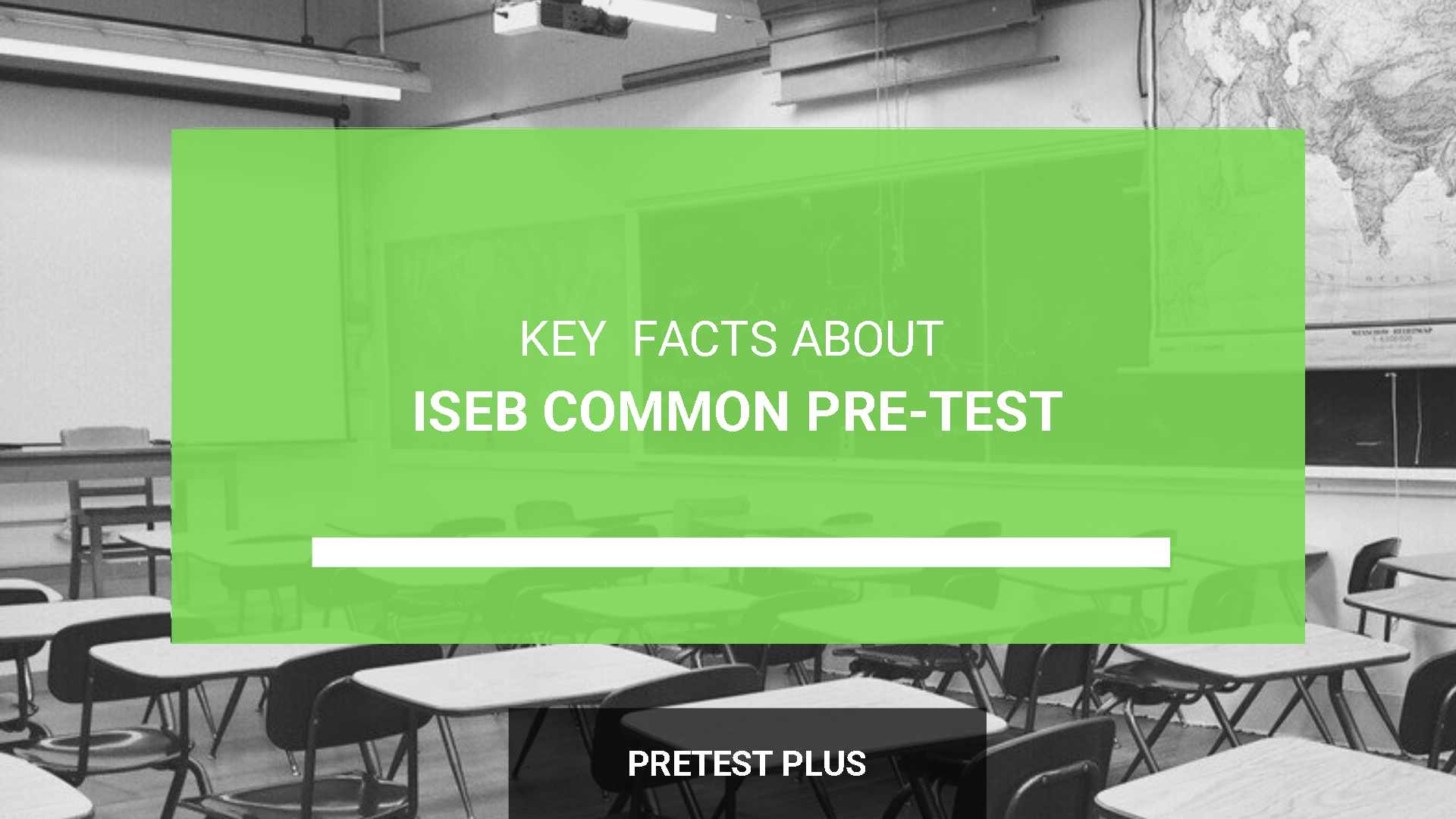
The ISEB Common Pre-test | What You Need to Know
Table of Contents
Introduction
The ISEB Common Pre-Test is designed to provide independent senior schools with information about a pupil’s current attainment and potential, prior to them taking Common Entrance in Year 8. We’ve put together this guide to the ISEB Common Pre-Test to help you better understand the exam.
Key facts About the ISEB Common Pre-Tests
– It is taken in Year 6 or 7 when pupils are aged between 10 and 12 years old.
– It provides a universal and standardised measure of attainment, ability and potential.
– It is made up of four tests comprising of: English, maths, verbal reasoning and non-verbal reasoning.
– All four tests take approximately 2.5 hours to complete.
– Tests can be taken together or separately (but each component must be finished in one sitting once started.)
– They are created for ISEB by GL assessment.
– They are online and adaptive.
– Questions are in multiple-choice format.
– Candidates are registered by the senior school (or schools) for which they are entered.
– Results are available to all senior schools for which the candidate is registered, so the candidate only has to sit one test.
– These tests are designed for the UK independent sector.
– A pupil can only take a test once. If multiple tests are taken, the first test result will stand.
– Candidates can take the tests in any location that has an internet connection, but they are normally taken at the child’s current prep school. If a child is overseas, then tests can be taken locally.
– In general, registration and administrative functions are the responsibility of the senior school and the taking of the tests is the responsibility of the prep school.
Why Pre-Test?
This means they are able to establish, one or two years in advance of a child potentially transferring to their school, if that child will meet the academic standard. If a child passes the Pre-Test, they will usually be offered a place contingent on them then passing Common Entrance at 13+.
Each school decides on how they use a child’s Common Pre-Test results. Highly selective, oversubscribed and popular senior schools may use the Pre-Test to de-select pupils. They will therefore tell some parents that their child has been eliminated from the admissions/Common Entrance process, and/or they may put them on a reserve list.
Which Schools use the ISEB Common Pre-Tests?
The ISEB Common Pre-Test is not the only pre-test available, but it is one of the most popular.
It is used by the following schools:
Abbot’s Hill School Pretest
Alleyn’s School Pretest
Ampleforth College Pretest
Ardingly College Pretest
Bedford School Pretest
Benenden School Pretest
Berkhamsted School Pretest
Bloxham School Pretest
Bradfield College Pretest
Brentwood School Pretest
Brighton College Pretest
Bryanston School Pretest
Canford School Pretest
Caterham School Pretest
Channing School Pretest
Charterhouse Pretest
City of London School Pretest
Cranleigh School Pretest
Culford School Pretest
Dauntsey’s School Pretest
Downe House School Pretest
Dulwich College Pretest
Eton College Pretest
Felsted School Pretest
Francis Holland School (NW1) Pretest
Francis Holland School (SW1) Pretest
Fulham Senior Pretest
Gateways School Pretest
Haberdashers’ Monmouth Schools Pretest
Harrow School Pretest
Headington School Pretest
Hurstpierpoint College Pretest 11 Plus
Hurstpierpoint College Pretest 13 Plus
James Allen’s Girls’ School (JAGS) Pretest
Kew House School Pretest
King’s College Taunton Pretest
King’s School Rochester Pretest
Lancing College Pretest
Leeds Grammar School Pretest
Leys School Pretest
Lord Wandsworth College Pretest
Maida Vale School Pretest
Marlborough College Pretest
Mayfield School Pretest
More House School Pretest
New Hall School Pretest
North Bridge House Senior Hampstead
Northwood College Pretest
Notting Hill and Ealing High School Pretest
Oratory School Pretest
Palmers Green High School Pretest
Pangbourne College Pretest
Queen’s College London Pretest
Queen’s Gate School Pretest
Radley College Pretest
Roedean School Pretest
Royal Grammar School (Guildford) Pretest
Royal Russell School Pretest
Seaford College Pretest
South Hampstead High School Pretest
St Albans High School for Girls Pretest
St Augustine Priory Pretest
St Benedict’s School Pretest
St Dunstan’s College Pretest
St Edward’s School Pretest
St Helen’s School Pretest
St James Senior Girls’ School Pretest
St Margaret’s School Pretest
St Paul’s School Pretest 11 Plus
St Paul’s School Pretest 13 Plus
St Swithun’s School Pretest 11 Plus
St Swithun’s School Pretest 13 Plus
Stowe School Pretest
Streatham & Clapham High School Pretest
Sutton Valence School Pretest 11 Plus
Sutton Valence School Pretest 13 Plus
The Godolphin and Latymer School Pretest
The Harrodian School Pretest
Tonbridge School Pretest
Tormead School Pretest
Uppingham School Pretest
Wellington College Pretest
Westminster School Pretest 11 Plus
Westminster School Pretest 13 Plus
Wetherby Senior School Pretest
Whitgift School Pretest
Winchester College Pretest
Woldingham School Pretest
Worth School Pretest
Source: ISEB website
How do Other Schools Pre-test?
Some schools create their own pre-tests, other use bespoke tests commissioned directly from GL or other providers, such as CEM. Some of these tests are online, some offline and some are a combination of both. Get in touch if you’re not sure of the requirements at the schools you are interested in and we will be happy to clarify.
Not every school pre-tests. Always check each individual school you intend to apply for and do so well in advance.
Can You Prepare for the ISEB Common Pre-Test?
There is no doubt that familiarity with the different question types, experience of the computerised interface and some knowledge of what to expect can significantly help. If a child is confident and not fazed by the process, they stand a better chance of performing to their maximum potential.
What You Need to Know in More Detail…
The ISEB Common Pre-Test is made up of four individual tests which can be taken at different times and in any order. However, candidates must complete each individual test in one sitting.
– English – assesses comprehension, sentence completion, spelling and punctuation.
– Maths – assesses mathematical ability relative to the national curriculum stage.
– Verbal reasoning – assesses thinking and problem solving with words
– Non-verbal reasoning – assesses thinking with shapes, space, diagrams and pictures.
In total, the four parts of the ISEB Common Pre-test take approximately 2.5 hours to administer and complete. There is no audio component to any of the tests. With the exception of the English test, each assessment contains example and practice questions. A pen and paper are allowed in the maths test for working out. No other test requires or allows for additional materials.
Each test has a timer and a time limit set for its completion. For each question candidates must select an answer from a choice of five and then press ‘next’ to submit. Candidates cannot return to a question once an answer has been submitted and the ‘next’ button pressed.
The timings for each test are below. This excludes the time required for each test to be set up and for login to be completed. It does however include the time required for candidates to read the on-screen instructions, and in the case of the English test, the time allotted for the reading of the comprehension passage.
– English – 25 minutes
– Maths – 50 minutes
– Verbal reasoning – 36 minutes
– Non-verbal reasoning – 32 minutes
Each test will begin with a set of instructions that candidates must read carefully. They will tell candidates how to navigate through the test. Each question is presented individually.
In the verbal reasoning test, two question types require a candidate to select more than one answer. If two answers are selected and the candidate wants to amend one of his choices, one answer must be de-selected before a new answer can be chosen.
Where the passage is presented in the English test, it will be visible on each question page and candidates can use a set of scroll buttons to navigate the text. For some questions, candidates will need to refer to a specific set of lines from the text.
A progress bar at the bottom of the screen tells candidates how many questions they have answered and a timer at the top of the screen will indicate how much time they have left.
Tests will be administered in a formal test environment even though they are being taken online. The usual expectations of behaviour and the constraints of a test will be in place. Candidates will be expected to work in silence. Whilst teachers will do their best to ensure that candidates are progressing appropriately and not rushing any part of the test/s, they cannot help with anything relating to the content of test questions.
How to Prepare Your Child for the ISEB Common Pre-Test
Now that you know a little more about what to expect, here are some practical things that you can do to prepare.
Get your child familiar with the computer interface and answering questions under strict timed conditions by using our practice tests and courses, which have been specifically designed for this purpose. The on-screen format, process, test duration and question types replicate the real test experience as closely as possible. By getting used to the process, your child will have an idea of what to expect and this will help them to approach the real test confidently and calmly.
Practice Tests
You can learn more about our highly accurate online ISEB Pretest practice tests by clicking on the links below. These Practice Tests are available to take online immediately after purchase. Each module is marked automatically and is then available for review with answers and explanations provided for every question. We also provide comparative ranking statistics on a per module basis so you can quickly identify your child’s strengths and weaknesses.
📈ISEB Pretest Practice Test 10
Video Courses
We’ve also produced online video courses that cover everything your child needs to know for each section of the ISEB Pretest assessment. These video courses consist of a series of lessons that go through each question type in great detail, providing step-by-step explanations and techniques to help your child recognise the underlying patterns to look out for. They cover every possible question type that could come up in the ISEB Pretest.


Skill Practice




Don’t forget to use the code ppdiscount at checkout to get 10% off orders over £80 and 20% off orders over £200!
You can also use paper resources to practice and become familiar with the question types. Take a look at the comprehensive 11+ range from Exam Papers Plus here.
We hope that this post has been useful. We will be producing more detailed posts on the individual sections in the coming weeks and look forward to your thoughts and feedback. Please get in touch if you have any questions, comments or queries.
All the best
The Pretest Plus Team




